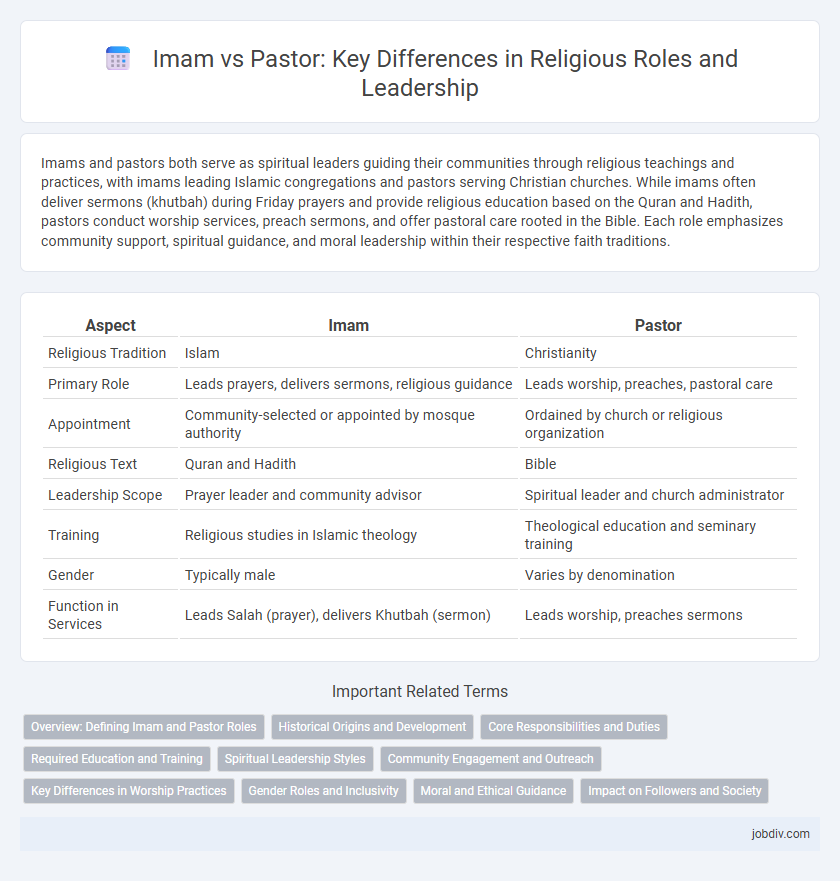Imams and pastors both serve as spiritual leaders guiding their communities through religious teachings and practices, with imams leading Islamic congregations and pastors serving Christian churches. While imams often deliver sermons (khutbah) during Friday prayers and provide religious education based on the Quran and Hadith, pastors conduct worship services, preach sermons, and offer pastoral care rooted in the Bible. Each role emphasizes community support, spiritual guidance, and moral leadership within their respective faith traditions.
Table of Comparison
| Aspect | Imam | Pastor |
|---|---|---|
| Religious Tradition | Islam | Christianity |
| Primary Role | Leads prayers, delivers sermons, religious guidance | Leads worship, preaches, pastoral care |
| Appointment | Community-selected or appointed by mosque authority | Ordained by church or religious organization |
| Religious Text | Quran and Hadith | Bible |
| Leadership Scope | Prayer leader and community advisor | Spiritual leader and church administrator |
| Training | Religious studies in Islamic theology | Theological education and seminary training |
| Gender | Typically male | Varies by denomination |
| Function in Services | Leads Salah (prayer), delivers Khutbah (sermon) | Leads worship, preaches sermons |
Overview: Defining Imam and Pastor Roles
An imam is a religious leader in Islam responsible for leading prayers, delivering sermons, and providing spiritual guidance within a mosque. A pastor serves as a Christian minister or priest who leads worship services, offers pastoral care, and oversees church activities. Both roles involve community leadership and interpretation of religious teachings, but they differ significantly in religious tradition and specific duties.
Historical Origins and Development
The historical origins of the imam trace back to early Islamic communities where imams served as religious leaders guiding prayers and interpreting the Quran. In contrast, the role of the pastor emerged from early Christian traditions as shepherds of congregations responsible for preaching and pastoral care. Both positions evolved over centuries within their distinct religious frameworks, shaping spiritual leadership according to Islamic and Christian doctrinal developments.
Core Responsibilities and Duties
Imams lead Islamic worship services, deliver sermons (khutbah), and provide spiritual guidance based on the Quran and Hadith, often also overseeing community matters and educational programs. Pastors serve Christian congregations by preaching Bible-based sermons, administering sacraments like communion and baptism, offering pastoral care, and leading church activities. Both roles emphasize spiritual leadership, counseling, and fostering religious education, tailored respectively to Islamic and Christian traditions.
Required Education and Training
Imams typically undergo extensive religious studies in Islamic theology, jurisprudence, and Quranic exegesis, often attending specialized madrassas or Islamic universities for several years to gain deep knowledge of Sharia and Islamic practices. Pastors usually complete a bachelor's degree in theology or divinity followed by seminary training, focusing on biblical studies, pastoral counseling, and church leadership, often earning a Master of Divinity (MDiv) or equivalent degree. Both roles require continuous spiritual development and community leadership skills, but the formal education paths differ significantly based on religious traditions and denominational requirements.
Spiritual Leadership Styles
Imams lead Muslim congregations through a blend of spiritual guidance, community involvement, and teaching the Quran, emphasizing humility and service. Pastors in Christian settings provide spiritual leadership by interpreting the Bible, offering pastoral care, and fostering congregational growth through sermons and counseling. Both roles shape faith experiences uniquely, reflecting distinct theological frameworks and cultural traditions.
Community Engagement and Outreach
Imams often lead community engagement through mosque activities like educational programs and charitable initiatives, fostering strong ties within Muslim neighborhoods. Pastors typically organize outreach efforts such as church-sponsored events, youth groups, and local service projects, strengthening communal bonds. Both roles emphasize spiritual leadership while actively promoting social support and inclusivity within their respective faith communities.
Key Differences in Worship Practices
Imams lead Islamic worship with a focus on communal prayers (Salah), often conducting them five times daily, emphasizing recitation of the Quran and physical prostrations. Pastors guide Christian worship by delivering sermons, leading hymns, and administering sacraments such as communion, typically during weekly services. The imam's role centers on facilitating ritual purity and adherence to Sharia law, while pastors emphasize teaching biblical doctrine and fostering spiritual fellowship.
Gender Roles and Inclusivity
Imams, traditionally male, often lead prayers and religious rituals in Islamic communities, reflecting long-standing gender roles, while pastors in many Christian denominations increasingly include women in leadership positions, promoting gender inclusivity. The role of female pastors challenges conventional gender norms and signifies a shift towards greater inclusivity within Christian congregations. Islamic communities vary, but most maintain male-only imamate roles, emphasizing traditional interpretations of gender-specific religious duties.
Moral and Ethical Guidance
Imams provide moral and ethical guidance rooted in Islamic teachings, emphasizing adherence to the Quran and Hadith for daily conduct and community relations. Pastors deliver ethical direction based on Christian scripture, focusing on the teachings of Jesus Christ and biblical principles to shape personal character and social behavior. Both serve as spiritual leaders who interpret sacred texts to address contemporary moral dilemmas and encourage virtuous living within their congregations.
Impact on Followers and Society
Imams guide their communities through religious teachings rooted in Islam, fostering strong social cohesion and spiritual discipline that influence daily life and community welfare. Pastors provide leadership within Christian congregations by delivering sermons, offering pastoral care, and encouraging moral development, thereby shaping individual behavior and promoting social justice initiatives. Both roles significantly impact their followers' worldview and societal values, serving as pivotal figures in moral guidance and communal support.
imam vs pastor Infographic

 jobdiv.com
jobdiv.com